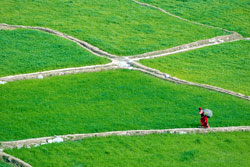|
|
India has banned all rice exports except Basmati. Pakistan has reintroduced rationing. Food riots have broken out in some African countries. The world is facing an unprecedented food shortage, and it is the poorest who are hit hardest by rising prices.
In Nepal the price of many food items have doubled in the past year (See box). Preoccupied with elections, the government seems unconcerned about the hardships suffered by millions of Nepalis.
The price of cooking oil has gone up by more than half in just three months. The prices of rice, pulses and meat have also increased significantly. India's export ban on non-Basmati rice and wheat has worsened Nepal's shortage ('Food insecurity', p 2)
But this is not the only reason for the price hike. The dramatic rise in oil prices, and the trend towards bio-fuels, increased demand for food and meat and growing affluence in India and China are the other reasons for worldwide shortages.
In Nepal, traders have another reason to raise prices of commodities: to recoup money they have 'donated' to various political parties for the elections. "Many traders have been compelled to increase the prices in order to make up for donations," said Jyoti Baniya, general secretary of the Consumers' Protection Forum.
| |||||||||||||||||||||||||||||||||||||||
Pabitra Bajracharya, president of Retailers' Association said that wholesalers are selling foodstuffs at a price higher than production cost, and the current price hikes are arbitrary and unnecessary. The fact that wholesalers are not issuing retailers with receipts is a tacit admittance of this fact.
"If we ask for a bill they refuse to sell us the goods at all. We have complained to the Department of Commerce, but no action has been taken," Bajracharya says.
Food economist Jagannath Adhikari says Nepal is feeling the spillover effect of the food shortage in India, but adds that traders are also creating an artificial shortage to gouge customers. Adhikari told Nepali Times: "Changing food habits are having an effect on prices, but the growing corporate control of food is starting to pose a serious threat to food security."
The WFP reports say that summer rice production in the Mid and Far Western Regions increased by 17 percent last year, but despite these good crop yields, food prices have increased significantly leaving an estimated 3.8 million extremely vulnerable.
In these regions, average household food stocks are down by half compared to a year ago. Many areas in the Mid and Far West have had bad winter harvests and are facing growing food deficit.
"Inadequate supply and price increases in food and non-food items have had a significant impact on the overall food security situation," the report states.



